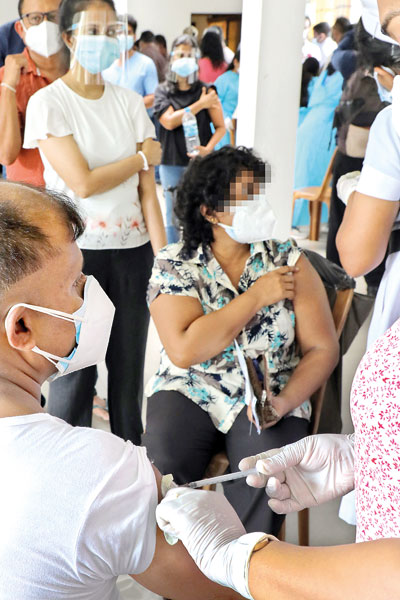News
Vaccine chaos: Too many decision-makers and lack of coordination – CCPSL
View(s):Ad hoc decision-making without a clear strategic plan in the vaccination campaign has created chaos and will lead to short and long-term repercussions, the Community Physicians warned yesterday.
In a critical media release titled ‘Vaccine politics: COVID-19 vaccination campaign’, the College of Community Physicians of Sri Lanka (CCPSL) has stated that this ad hoc decision-making is to fulfil individual requirements or respond to critics.

Vaccination of the public underway. Pic by M.A. Pushpa Kumara
“The COVID-19 vaccination campaign should ideally have had timely procurement of vaccines, financial resource allocation, staff training, well-coordinated deployment and, most importantly, a clear roll-out strategy to reach the high-risk groups quickly. This should have gone hand-in-hand with adequate pre-planning, risk communication and preparation of field staff to deliver routine work uninterruptedly,” states the CCPSL.
Explaining that since the last week of January 2021 (this year), Sri Lanka has received three different vaccines (AztraZeneca, Sputnik-V and Sinopharm) primarily as donations, with purchases of only 500,000 AstraZeneca vaccines, the CCPSL has said that following the initiation of vaccination campaign, Sri Lanka has experienced and is still facing a surge of cases. Only <8% of the target population has so far received at least a single dose of vaccine against COVID-19.
“The COVID-19 decision-making process in Sri Lanka is a fully centralized procedure with all decisions related to resource allocation, control strategies, vaccination deployment, etc. being taken at the top level. We observed that too many decision-makers and lack of coordination have led to many issues during the COVID-19 control in Sri Lanka,” it reiterates.
According to the CCPSL, Sri Lanka’s usual Immunization Programme is globally considered as one of the most successful, with high coverage and early achievements including in the elimination of polio and measles. The Epidemiology Unit is the centre of excellence for vaccine procurement and surveillance for adverse events following immunization. The Immunization Programme has functioned in a decentralized manner, fully integrated into the public health system. All public health staff at the divisional level, including the Medical Officer of Health (MOH) and staff are well trained in the vaccination procedure.
| 80 COVID-19 patients in ICU beds By Ruqyyaha Deane With concerns whether Sri Lanka has adequate intensive care facilities in the light of an increase in the number of COVID-19 patients with severe disease, a Health Ministry official said that they have earmarked 109 ICU beds for such patients. Eighty beds were occupied as of Friday afternoon, said the Director of Medical Technical Services and Coordinator-in-Charge of COVID-19 Control, Dr. Anver Hamdani. “We are improving the facilities on a daily and staggered basis. We have also planned for around 35 more ICU beds in district general hospitals,” he said, adding that the overall bed capacity for COVID-19 is 23,229 beds in 148 treatment institutions. When asked about treatment facilities for COVID-19 patients in private hospitals, Dr. Hamdani said that there are guidelines for these facilities. | |

